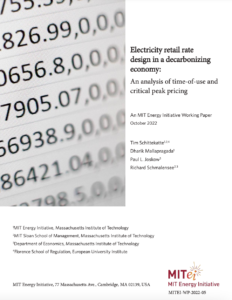Full Title: Electricity Retail Rate Design in a Decarbonizing Economy: An analysis of time-of-use and critical peak pricing
Author(s): Tim Schittekatte, Dharik Mallapragada, Paul L. Joskow, and Richard Schmalensee
Publisher(s): MIT Energy Initiative
Publication Date: October 13, 2022
Full Text: Download Resource
Description (excerpt):
Currently, U.S. residential and small commercial electricity consumers typically pay a constant price per kWh consumed that accounts for most of their bill. Ongoing developments in the power system, both on the supply and demand sides, increase efficiency gains that can be made from exposing consumers to widely varying wholesale spot prices. Pure spot pricing is not popular among consumers; consumers value price predictability and bill stability. Also, sudden increases in bills often become a political problem. We focus on second-best alternatives: time-of-use (TOU) and critical peak pricing (CPP). The existing literature has been skeptical about TOU rates, typically finding that they capture only about one-fifth of the efficiency gains compared to passing through wholesale spot prices to consumers. We introduce alternative assessment criteria that are tailored to a context with high volumes of intraday shiftable loads such as the charging of electric vehicles and the cycling of heat pumps.
Using historical data from CAISO, ERCOT, and ISO-NE, we find that out-of-sample daily Spearman rank correlations between TOU rates and spot prices can be relatively high (averaging 0.7-0.8), and simulations confirm that TOU rates can reasonably replicate the loadshifting incentives provided underspot pricing (up to 60-70% of the potential). We recommend the acceleration of the adoption of TOU rates, especially when accompanied by a CPP program built around load control options, as a valuable intermediate step towards improved electricity retail rates that balance efficiency considerations and the consumer (and political) preference for price predictability and bill stability.
